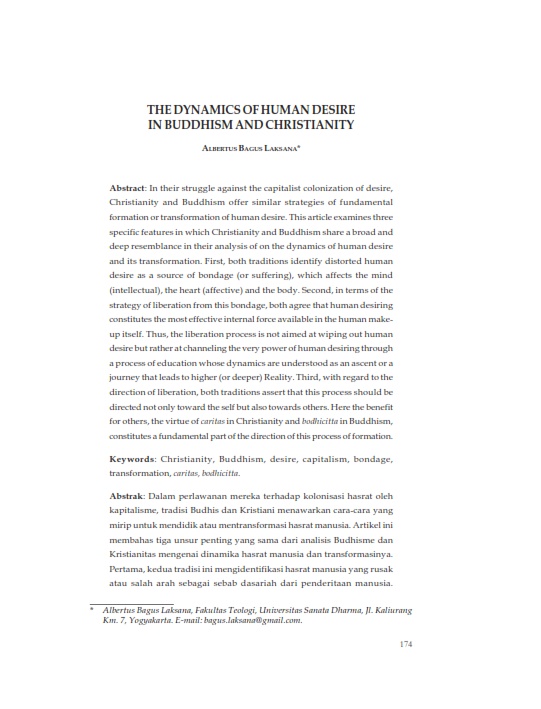The Dynamics Of Human Desire In Buddhism And Christianity
Abstract
Abstract: In their struggle against the capitalist colonization of desire, Christianity and Buddhism offer similar strategies of fundamental formation or transformation of human desire. This article examines three specific features in which Christianity and Buddhism share a broad and deep resemblance in their analysis of on the dynamics of human desire and its transformation. First, both traditions identify distorted human desire as a source of bondage (or suffering), which affects the mind (intellectual), the heart (affective) and the body. Second, in terms of the strategy of liberation from this bondage, both agree that human desiring constitutes the most effective internal force available in the human make up itself. Thus, the liberation process is not aimed at wiping out human desire but rather at channeling the very power of human desiring through a process of education whose dynamics are understood as an ascent or a journey that leads to higher (or deeper) Reality. Third, with regard to the direction of liberation, both traditions assert that this process should be directed not only toward the self but also towards others. Here the benefit for others, the virtue of caritas in Christianity and bodhicitta in Buddhism, constitutes a fundamental part of the direction of this process of formation.
Keywords: Christianity, Buddhism, desire, capitalism, bondage,transformation, caritas, bodhicitta.
Abstrak: Dalam perlawanan mereka terhadap kolonisasi hasrat oleh kapitalisme, tradisi Budhis dan Kristiani menawarkan cara-cara yang mirip untuk mendidik atau mentransformasi hasrat manusia. Artikel ini membahas tiga unsur penting yang sama dari analisis Budhisme dan Kristianitas mengenai dinamika hasrat manusia dan transformasinya. Pertama, kedua tradisi ini mengidentifikasi hasrat manusia yang rusak atau salah arah sebagai sebab dasariah dari penderitaan manusia. Kerusakan hasrat ini juga mempengaruhi dimensi intelektual, afektif dan juga tubuh manusia. Kedua, perihal cara pembebasan dari penderitaan ini, kedua tradisi ini juga sepakat bahwa hasrat manusia merupakan dayainternal paling efektif dalam diri manusia sendiri. Karena itu, proses pembebasan ini tidak dimaksudkan untuk membuang hasrat dari kemanusiaan, melainkan untuk menyalurkan daya hasrat ini melalui proses transformasi yang berdinamika “mendaki,” sebuah perjalanan menuju Realitas yang lebih tinggi atau dalam. Ketiga, mengenai arah pembebasan ini, kedua tradisi menekankan bahwa proses ini ditujukan tidak hanya untuk diri sendiri melainkan juga sesama. Dalam hal ini, kepentingan sesama seperti diungkapkan oleh keutamaan caritas dalam Kristianitas dan bodhicitta dalam Budhisme merupakan bagian dasariah dari arah transformasi hasrat manusia itu sendiri.
Kata-kata kunci: Kristianitas, Budhisme, hasrat, kapitalisme, penderitaan, transformasi, caritas, bodhicitta.

DISKURSUS applies the Creative Commons license (CC BY). We allow readers to read, download, copy, distribute, print, search, or link to the full texts of its articles and allow readers to use them for any other lawful purpose. The author must be aware that the article copyrights will be fully transferred to DISKURSUS if the article is accepted to be published in the journal. Once the manuscript has been published, authors are allowed to use their published article under DISKURSUS copyrights. Full information about CC BY can be found here: https://creativecommons.org/licenses/by/4.0/












